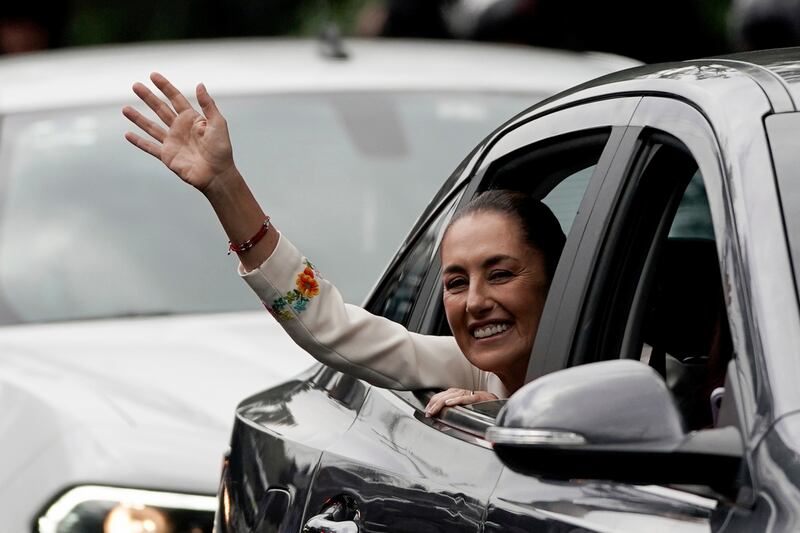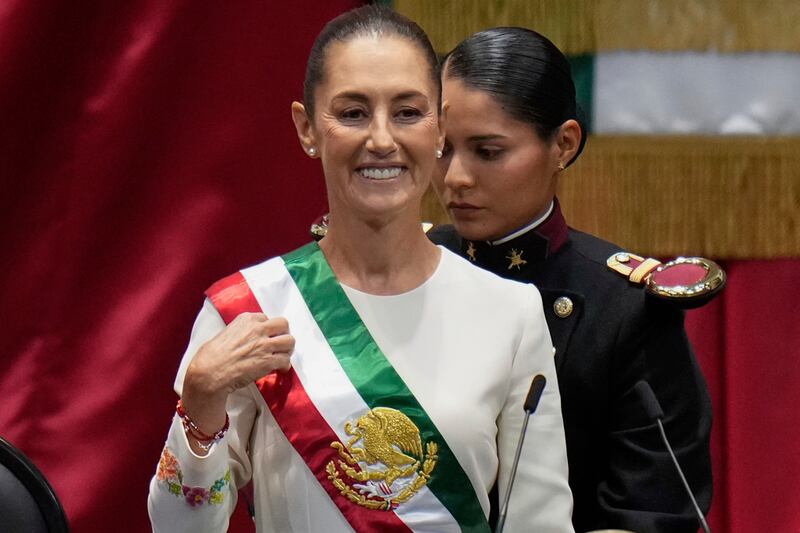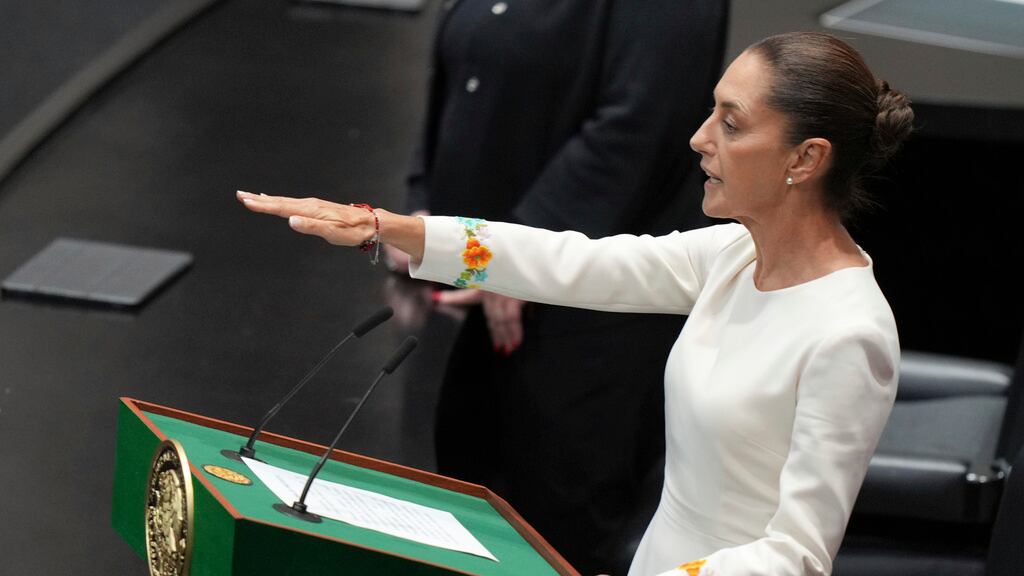MEXICO CITY (AP) — Claudia Sheinbaum made history on Tuesday by assuming the role of the first female president of Mexico after receiving the presidential sash from the historic leftist fighter Ifigenia Martínez, president of the Chamber of Deputies.
PUBLICIDAD
He received the presidential sash from the President of the Chamber of Deputies, Ifigenia Martínez, a historic leftist fighter from Mexico at 94 years old, and under the watchful eye of his predecessor, Andrés Manuel López Obrador, the most popular ruler in recent Mexican history.
PUBLICIDAD
"I swear to uphold and enforce the Political Constitution of the United Mexican States and the laws that emanate from it, and to faithfully and patriotically carry out the duties of the President of the Republic that the people have conferred upon me, always looking out for the well-being and prosperity of the nation. And if I fail to do so, may the Nation demand it of me," said Sheinbaum.
Her words were met with cheers for the new leader and for Mexico.
The 62-year-old scientist and former mayor of the capital arrived at the Chamber after a tour through the streets of the capital, waving from her vehicle with happiness reflected on her face for the ceremony that will put her in charge of a country with great challenges and uncertainty about what changes she will introduce to her administration and if she will leave her personal mark. She was welcomed with cheers of "president, president."

If López Obrador symbolized change and the push to leave behind a country marked by corruption and violence, always putting the most disadvantaged first, his successor proposes absolute continuity both in successful social programs and in controversial constitutional changes that will deepen the militarization of the country or make judges elected by popular vote.
Furthermore, both politicians have very different personalities.
"López Obrador was a tremendously charismatic president and many times that charisma allowed him to cover up some policy mistakes. Claudia Sheinbaum will not have that possibility," said Carlos Pérez Ricart, a professor at the Center for Research and Teaching in Economics. "So, where López Obrador was charismatic, Claudia Sheinbaum will have to be effective."
Sheinbaum will give her first message to the nation in the Chamber of Deputies and then will have a public appearance in the Zócalo, the main square of the capital, where she will announce her 100 government commitments.
A dozen presidents and heads of government are present among the various international delegations, including the leaders of Brazil, Chile, and Cuba.
But the fact that the United States decided to send a delegation led by the first lady, Jill Biden—when in 2018 it was Vice President Mike Pence who attended López Obrador's inauguration—or the complete absence of the Spanish government—outraged because Sheinbaum did not invite the king to the ceremony arguing that she did not want to ask for forgiveness for the conquest—are examples of the uncertainties surrounding the new government and the tension between Mexico and some of its main partners.
The United States has expressed its concerns about constitutional reforms that, in its view, will politicize the judiciary and jeopardize basic principles of the rule of law, while also increasing tensions on security issues and the fight against cartels.
One of the most delicate points in this aspect is located in Sinaloa, a state where two factions of the cartel of the same name started an all-out battle after two of their leaders were arrested in the United States. Both local authorities and the military - in which López Obrador has trusted for everything - have admitted that the confrontations will only end when the cartel bosses decide to put an end to them.

Jill Biden, however, expressed on Monday her conviction that with Sheinbaum, both countries will continue to build "a more prosperous, secure, and democratic region."
Another major uncertainty will be related to the outcome of the US elections in November because, if Donald Trump wins, a scenario could unfold in which the Republican could take radical actions at the border or impose tariffs that would significantly complicate Sheinbaum's government.
Sheinbaum has stated that she wants to govern for everyone, although it is not clear how open to dialogue she will be on the most delicate issues.
Her challenges are many.
In addition to security issues and internal criticism of the constitutional changes that will continue in the coming months - and which are expected to be heard this Tuesday in different protests - there is uncertainty about how the funding for all social programs and unfinished and new infrastructure projects will be maintained.
Her first trip as president will be to Acapulco, a port city on the southern Mexican Pacific coast that just a year after being devastated by Hurricane Otis, was flooded by the torrential rain from John, a very erratic storm that made landfall twice and has left at least 17 dead in the states along the Pacific coast.
There are areas where Sheinbaum could try to take Mexico in a new direction. With a PhD in energy engineering, she appears more willing to take actions to mitigate the effects of climate change while her predecessor built a huge new oil refinery and injected money into the state oil company. However, her budget commitments do not leave her much room for maneuver.
What does generate expectations in certain sectors is the fact that a woman reaches the presidency, more than 70 years after they could vote for the first time and in a country with high rates of gender-based violence.
“The women who are the first to achieve something are powerful symbols,” said Jennifer Piscopo, a specialist in Latin America and gender issues at Royal Holloway University in London. “But they do not have magical powers, especially when the challenges of governance are so significant.”
